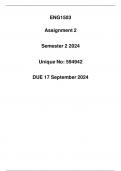ENG1503
Assignment 2
Semester 2 2024
Unique No: 594942
DUE 17 September 2024
, Essay: The Impact of Incorporating Financial Literacy in Schools on Better
Financial Decision-Making
Financial literacy has become increasingly essential in today's complex economic
landscape. The integration of financial literacy as a subject in schools has been a
topic of significant debate. Drawing from Text A and supported by additional
readings, this essay argues that incorporating financial literacy into the school
curriculum is likely to enable individuals to make better financial decisions. The
essay will present a clear stance, supported by reasons and evidence,
demonstrating how financial literacy education can positively influence decision-
making and financial well-being.
Thesis Statement
Incorporating financial literacy as a subject in schools equips students with essential
skills and knowledge, leading to improved financial decision-making and long-term
economic stability.
Arguments in Favor of Financial Literacy Education
1. Foundation for Informed Decision-Making
Financial literacy education provides students with a foundational understanding of
key financial concepts, such as budgeting, saving, investing, and managing debt.
According to Text A, financial literacy helps individuals develop critical thinking skills
that are crucial for making informed financial decisions (Author, Year). By
understanding the principles of personal finance early on, students are better
prepared to manage their finances responsibly. This foundation reduces the
likelihood of poor financial decisions that can lead to debt and financial instability.
2. Enhanced Economic Stability and Personal Growth
Introducing financial literacy in schools can significantly contribute to economic
stability and personal growth. Research indicates that individuals who receive
financial education are more likely to practice sound financial habits, such as regular
savings and prudent spending (Author, Year). Financial literacy equips students with
the tools to plan for their future, avoid financial pitfalls, and make informed choices
regarding loans, credit, and investments. This knowledge ultimately contributes to
greater financial security and reduces the risk of falling into financial distress.




